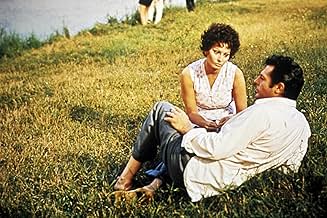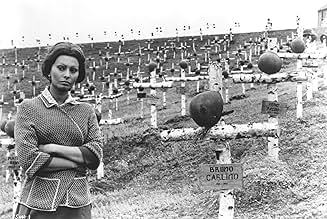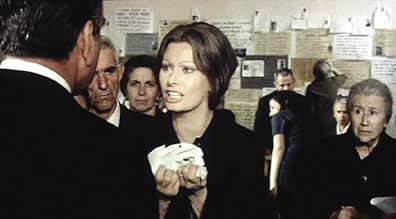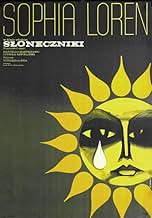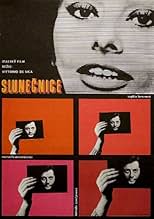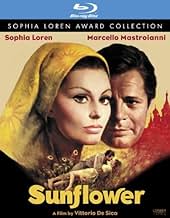NOTE IMDb
7,3/10
4,9 k
MA NOTE
Une femme italienne mène une recherche désespérée pour retrouver son mari, un soldat porté disparu au combat en Russie pendant la Seconde Guerre mondiale.Une femme italienne mène une recherche désespérée pour retrouver son mari, un soldat porté disparu au combat en Russie pendant la Seconde Guerre mondiale.Une femme italienne mène une recherche désespérée pour retrouver son mari, un soldat porté disparu au combat en Russie pendant la Seconde Guerre mondiale.
- Réalisation
- Scénario
- Casting principal
- Nommé pour 1 Oscar
- 1 victoire et 2 nominations au total
Lyudmila Saveleva
- Mascia
- (as Ljudmila Saveljeva)
Nadya Serednichenko
- Contadina russa
- (as Nadja Cerednicenko)
Gunars Cilinskis
- Funzionario russo
- (as Gunnar Zilinskij)
Carlo Ponti Jr.
- Giovanna's Baby
- (non crédité)
Mariya Sapozhnikova
- Passerby
- (non crédité)
Avis à la une
In Naples, in World War II, the local Giovanna (Sophia Loren) has a torrid love affair with the soldier Antonio (Marcello Mastroianni), who is ready to embark to Africa. Giovanna proposes him to get married with her to get a leave of twelve days; then Antonio pretends that he is insane and he is sent to an asylum. However, the doctors discover the farce and they give the option to Antonio to go to the Russian front as volunteer instead of being sued. When Antonio is missing in action in Russia, Giovanna does not accept that he is dead. Years after the end of the war, Giovanna travels to Russia with a picture of Antonio to seek him out in the countryside. When she finds a lead in a village, her hope becomes disappointment with truth about his disappearance.
"I Girasoli" is one of the most famous romances of cinema and discloses a beautiful story of love, hope, truth and renounce. Vittorio De Sica explores the chemistry between Sophia Loren and Marcello Mastroianni to the best, supported by a magnificent cinematography and the wonderful soundtrack of Henry Mancini, which certainly is among the most beautiful ones of the cinema history. The screenplay uses much ellipsis, and my remarks are the lack of dates, leaving the viewer without any reference of how many years have passed; further, the dialogs in Russian that are not translated. My vote is eight.
Title (Brazil): "Os Girassóis da Rússia" ("The Russia's Sunflowers")
"I Girasoli" is one of the most famous romances of cinema and discloses a beautiful story of love, hope, truth and renounce. Vittorio De Sica explores the chemistry between Sophia Loren and Marcello Mastroianni to the best, supported by a magnificent cinematography and the wonderful soundtrack of Henry Mancini, which certainly is among the most beautiful ones of the cinema history. The screenplay uses much ellipsis, and my remarks are the lack of dates, leaving the viewer without any reference of how many years have passed; further, the dialogs in Russian that are not translated. My vote is eight.
Title (Brazil): "Os Girassóis da Rússia" ("The Russia's Sunflowers")
I just finished watching the stunning Blu Ray of the original Italian English-subtitled version of this film--the best version available. I do not understand all the naysayers reviewing this film. If you are a fan of Loren and Mastroianni, if you are a fan of DeSica, if you enjoy a good old-fashioned melodrama that will tear at your heart, you MUST see this film! To dismiss this film as Soviet propaganda, or as unrealistic, is like criticizing "The Little Mermaid" for having a singing mermaid and talking fish. It utterly misses the point. This movie contains one of the very best, if not THE best Sophia Loren performance on film. Henri Mancini's score is unforgettable. This film makes you care about the plight of both characters. It is available as part of the new "Sophia Loren Collection" box set, and for me, this, along with "Marriage Italian Style," is the "jewel" of the set. See it!
"I Girasoli" is certainly one of the best romantic stories in an honest and pure setting in Italy and Russia. It is a dramatic love story of Antonio and Giovana wanting to stay together in the war. The impossibility to hold on to the newly found and sweetest happiness becomes inevitable in the destructive war, where Anoinio is found half frozen by a Russian woman. The accent lies in finding love in warm sunny Italy and loosing this in the freezing cold war thousands of miles away. Although in this new other world there is love too, it is never the same as before. At the end the search for the lost love is completed and in vain when life has changed there lives irreversibly. Un impossibile ritorno al passato.
I suppose this film is just a maudlin melodrama, so is the music by Mancini. But then..., what a marvelous maudlin melodrama!... Why shouldn't it be? what's wrong with maudlin melodramas? If they are well done and authentic with their characters, if we get wrapped up with their emotions..., well, can you ask for anything more?
I just saw this movie on "You Tube" for the second time. I remember seen it on late TV in Italy, many years ago, and the impression was so powerful that after somebody mentioned it a few days ago --I didn't remember any more this title until they mentioned it-- I decided to look for it and watch it again, to see after so many years if the impression was still the same (so many films are a total disappointment when seen for a second time years later), but it wasn't the case with this one.
The story is so poignant that it can hold on its own very well no matter the change in mores and film technical improvements, it definitely grabs your interest till the very end (I must admit the film is far from perfect, since, for example, there are no indications of how many years went by or the new life style Sophia's character turns to after her Russian trip.
It also has two climaxes, both marvelous, but I think they should have decided for one or the other, two climaxes is too much within the same movie, and the length should have been shortened quite a bit.
Anyhow, forget about the lachrymose side of the story and submerge yourself in it (also get some Kleenex handy because everybody will need them, and plenty) and if you have to have a good cry, well, have it and enjoy it!! (After all is just a movie).
I just saw this movie on "You Tube" for the second time. I remember seen it on late TV in Italy, many years ago, and the impression was so powerful that after somebody mentioned it a few days ago --I didn't remember any more this title until they mentioned it-- I decided to look for it and watch it again, to see after so many years if the impression was still the same (so many films are a total disappointment when seen for a second time years later), but it wasn't the case with this one.
The story is so poignant that it can hold on its own very well no matter the change in mores and film technical improvements, it definitely grabs your interest till the very end (I must admit the film is far from perfect, since, for example, there are no indications of how many years went by or the new life style Sophia's character turns to after her Russian trip.
It also has two climaxes, both marvelous, but I think they should have decided for one or the other, two climaxes is too much within the same movie, and the length should have been shortened quite a bit.
Anyhow, forget about the lachrymose side of the story and submerge yourself in it (also get some Kleenex handy because everybody will need them, and plenty) and if you have to have a good cry, well, have it and enjoy it!! (After all is just a movie).
meeting between two great actors and an impressive director. images from Italy and picture of Russia in the air of Cold War.a basic story about a couple, a war and a choice. a travel and the form of truth. beautiful music and force of unspoken words. that is all. or only gentle performance of Ludmila Savelieva. a great film. not for cast or dramatic slices, for the force of emotions or for the sunflower as vegetable testimonies about a tragedy. but only for its virtue to be a seed. a seed of questions and answers. an exercise of empathy. a sad love story in which love is more than feeling. a poem but just a very special poem. mixture of pure joy, shadows of war, a miracle and a search, it is homage to a sacrifice generation and reflection of deep need of sense in a chaotic world. nothing pink, nothing cold. only picture of a man, a young Russian woman who speaks Italian, a charming Sophia Loren and same Mastroianni. but the essence is possession of public.
Le saviez-vous
- AnecdotesThe child of Giovanna (Sophia Loren) in this film was actually Loren's from her partnership with producer Carlo Ponti.
- GaffesMascia tells Giovanna that when she found Antonio, he was hurt so badly that he had forgotten everything, including his own name. If that's true, then how did Mascia know his name was Antonio?
- ConnexionsEdited into Marcello, una vita dolce (2006)
Meilleurs choix
Connectez-vous pour évaluer et suivre la liste de favoris afin de recevoir des recommandations personnalisées
- How long is Sunflower?Alimenté par Alexa
Détails
- Durée
- 1h 47min(107 min)
- Mixage
- Rapport de forme
- 1.85 : 1
Contribuer à cette page
Suggérer une modification ou ajouter du contenu manquant


